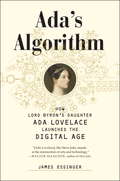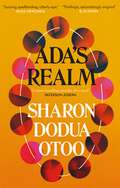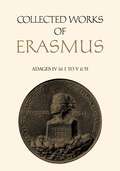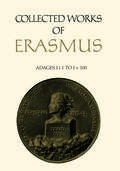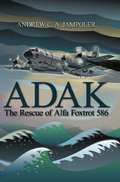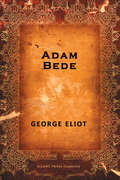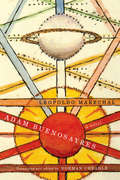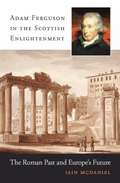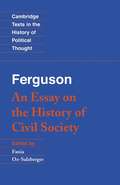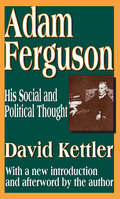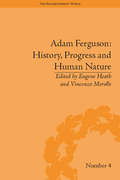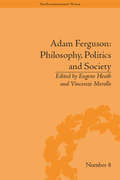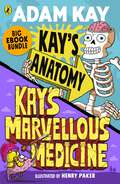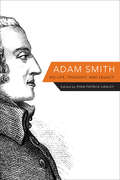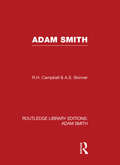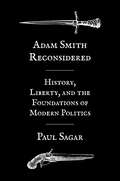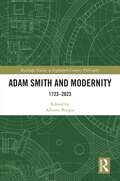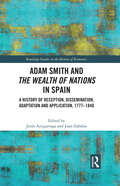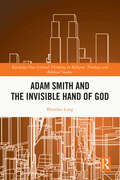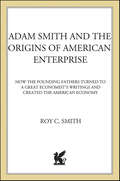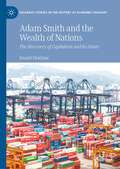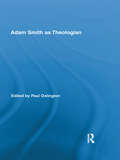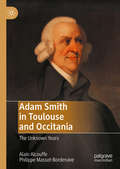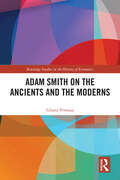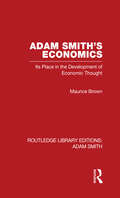- Table View
- List View
Ada's Algorithm
by James Essinger"Readers are treated to an intimate portrait of Lovelace's short but significant life along with an abbreviated history of 19th-century high-society London."--New CriterionOver 150 years after her death, a widely-used scientific computer program was named "Ada," after Ada Lovelace, the only legitimate daughter of the eighteenth century's version of a rock star, Lord Byron. Why?Because, after computer pioneers such as Alan Turing began to rediscover her, it slowly became apparent that she had been a key but overlooked figure in the invention of the computer.In Ada Lovelace, James Essinger makes the case that the computer age could have started two centuries ago if Lovelace's contemporaries had recognized her research and fully grasped its implications.It's a remarkable tale, starting with the outrageous behavior of her father, which made Ada instantly famous upon birth. Ada would go on to overcome numerous obstacles to obtain a level of education typically forbidden to women of her day. She would eventually join forces with Charles Babbage, generally credited with inventing the computer, although as Essinger makes clear, Babbage couldn't have done it without Lovelace. Indeed, Lovelace wrote what is today considered the world's first computer program--despite opposition that the principles of science were "beyond the strength of a woman's physical power of application."Based on ten years of research and filled with fascinating characters and observations of the period, not to mention numerous illustrations, Essinger tells Ada's fascinating story in unprecedented detail to absorbing and inspiring effect.From the Hardcover edition.
Ada's Realm
by Sharon Dodua Otoo"Set to be one of the best books of 2023" GQ Magazine"Soaring, spellbinding, utterly epic" MUSA OKWONGA"An impressive and highly original work, brimming over with energy" TLSWHERE IS ADA? In a small village in West Africa, in what will one day become Ghana, Ada gives birth again, and again the baby does not live. As she grieves the loss of her child, Portuguese traders become the first white men to arrive in the village, an event that will bear terrible repercussions for Ada and her kin. WHEN IS ADA?Centuries later, Ada will become the mathematical genius Ada Lovelace; Ada, a prisoner forced into prostitution in a Nazi concentration camp; and Ada, a young, pregnant Ghanaian woman with a new British passport who arrives in Berlin in 2019 for a fresh start. WHO IS ADA?Ada is not one woman, but many, and she is all women - she revolves in orbits, looping from one century and from one place to the next. And so, she experiences the hardship but also the joy of womanhood: she is a victim, she offers resistance, and she fights for her independence. This long-awaited debut from Sharon Dodua Otoo paints an astonishing picture of femininity, resilience and struggle with deep empathy and humour, with vivid language and infinite imagination."Sharon Dodua Otoo's writing defies expectations. Ada's Realm pushes boundaries in terms of language, form, character and time, challenging perceptions of what it means to be African, an African woman, in both historical and contemporary terms. More power to her pen!" MARGARET BUSBY"Thrillingly, astonishingly original." R. O. KWON"A work of fierce imagination" NII AYIKWEI PARKES"A rule-shattering novel" Kirkus Reviews Translated from the German by Jon Cho-Polizzi
Adages IV iii 1 to V ii 51: Adages Iv Iii 1 To V Ii 51 (Collected Works of Erasmus #36)
by John Grant Desiderius Erasmus Betty Knott-SharpeThis sixth of seven volumes devoted to the Adages in the Collected Works of Erasmus completes the translation and annotation of the more than 4000 proverbs gathered and commented on by Erasmus in his Adagiorum Chiliades (Thousands of Adages, usually known more simply as the Adagia). This volume’s aim, like that of the others, is to provide a fully annotated, accurate, and readable English version of Erasmus' commentaries on these Greek and Latin proverbs, and to show how Erasmus continued to expand this work, originally published in 1508, until his death in 1536. An indication of Erasmus' unflagging interest in classical proverbs is that almost 500 of the 951 adages translated in this volume did not make their first appearance until the edition of 1533. Following in the tradition of meticulous scholarship for which the Collected Works of Erasmus is widely known, the notes to this volume identify the classical sources and illustrate how the content of his commentaries on the adages often reflects Erasmus' scholarly and editing interests in the classical authors at a particular time. The work was highly acclaimed and circulated widely in Erasmus' time, serving as a conduit for transmitting classical proverbs into the vernacular languages, in which many of the proverbs still survive to this day. Volume 36 of the Collected Works of Erasmus series.
Adages: Ii1 to Iv100
by Desiderius Erasmus Margaret Mann Phillips R.A.B. MynorsErasmus' Adagia has been called 'one of the world's biggest bedside books,' and certainly the more than 4000 proverbs and maxims gathered and commented on by Erasmus, sometimes in a few lines and sometimes in full-scale essays, have great appeal for both scholar and educated layman. The aim of the Adages was to recapture, in this handy portmanteau form, the outlook and way of life of the classical world through its customs, legends, and social institutions, and to put within reach of a modern public the accumulated wisdom of the past. Each adage is traced in the works of as many authors as Erasmus had to hand; always an authority is given (usually several) and often a close reference providing chapter and verse. The commentaries in the Adages give a forthright and often eloquent expression of Erasmus' opinions on the world of his day, dovetailing with his satirical works on the one hand and his popular evangelical writings on the other. Many, if not most, of the proverbs cited by Erasmus are still in our common stock of speech today. The Collected Works of Erasmus is providing the first complete translation of Erasmus' Adagia. This volume contains the initial 300 adages with notes that identify the classical sources and indicate how Erasmus' reading and thinking developed over the quarter-century spanned by the eight revisions of the original work. Volume 31 of the Collected Works of Erasmus series.
Adak
by Andrew C. JampolerIn the tradition of great tales of men against the sea, this story offers a compelling look at courage and commitment in the face of certain tragedy. It is a powerful blend of human drama and real-life naval operations, but unlike most books in the genre, its heroes are airmen not seamen, and most survived their ordeal. Published on the twentieth-fifth anniversary of Alfa Foxtrot 586's fatal mission as a tribute to those lost, the account was written by a naval aviator who has flown the same aircraft on the same mission from the same air base. The aircraft is a P-3 Orion on station during a sensitive mission off the Kamchatka Peninsula in the north Pacific. The time is mid-day on 26 October 1978. Andy Jampoler takes readers into the cockpit of the turboprop as a propeller malfunction turns into an engine fire, eventually forcing Jerry Grigsby to ditch his patrol plane into the empty, mountainous seas west of the Aleutian Islands. His fourteen crewmembers, strapped in their seats, expect the worst--and get it. The aircraft goes down in just ninety seconds, taking one of the three rafts with it. A second raft, terribly overcrowded, soon begins to leak.The flight crew's desperate battle to survive is told with the authority, drama, and sensitivity that only someone with the author's background could provide. He draws on interviews with survivors, searchers, and even the master of the Soviet fishing trawler that saved the living and recovered the bodies of the dead. He also draws on recordings of radio communications, messages in the files of the state and defense departments, and the patrol squadron's own investigation of the ditching. Everyone who likes survival epics and enjoys reading sea and air adventures will be entertained by this engrossing true story.
Adam Bede: Silas Marner
by George EliotMuch admired for its depiction of rural life and rustic types, Adam Bede is the tale of a carpenter, the beautiful egotist Hetty Sorrel and the tragic death of a child.
Adam Buenosayres: A Novel
by Leopoldo MarechalA modernist urban novel in the tradition of James Joyce, Adam Buenosayres is a tour-de-force that does for Buenos Aires what Carlos Fuentes did for Mexico City or José Lezama Lima did for Havana - chronicles a city teeming with life in all its clever and crass, rude and intelligent forms. Employing a range of literary styles and a variety of voices, Leopoldo Marechal parodies and celebrates Argentina's most brilliant literary and artistic generation, the martinfierristas of the 1920s, among them Jorge Luis Borges. First published in 1948 during the polarizing reign of Juan Perón, the novel was hailed by Julio Cortázar as an extraordinary event in twentieth-century Argentine literature. Set over the course of three break-neck days, Adam Buenosayres follows the protagonist through an apparent metaphysical awakening, a battle for his soul fought by angels and demons, and a descent through a place resembling a comic version of Dante's hell. Presenting both a breathtaking translation and thorough explanatory notes, Norman Cheadle captures the limitless language of Marechal's original and guides the reader along an unmatched journey through the culture of Buenos Aires. This first-ever English translation brings to light Marechal's masterwork with an introduction outlining the novel's importance in various contexts - Argentine, Latin American, and world literature - and with notes illuminating its literary, cultural, and historical references. A salient feature of the Argentine canon, Adam Buenosayres is both a path-breaking novel and a key text for understanding Argentina's cultural and political history.
Adam Ferguson in the Scottish Enlightenment
by Iain McdanielAlthough overshadowed by his contemporaries Adam Smith and David Hume, the Scottish philosopher Adam Ferguson strongly influenced eighteenth-century currents of political thought. A major reassessment of this neglected figure, Adam Ferguson in the Scottish Enlightenment: The Roman Past and Europe’s Future sheds new light on Ferguson as a serious critic, rather than an advocate, of the Enlightenment belief in liberal progress. Unlike the philosophes who looked upon Europe’s growing prosperity and saw confirmation of a utopian future, Ferguson saw something else: a reminder of Rome’s lesson that egalitarian democracy could become a self-undermining path to dictatorship. Ferguson viewed the intrinsic power struggle between civil and military authorities as the central dilemma of modern constitutional governments. He believed that the key to understanding the forces that propel nations toward tyranny lay in analysis of ancient Roman history. It was the alliance between popular and militaristic factions within the Roman republic, Ferguson believed, which ultimately precipitated its downfall. Democratic forces, intended as a means of liberation from tyranny, could all too easily become the engine of political oppression-a fear that proved prescient when the French Revolution spawned the expansionist wars of Napoleon. As Iain McDaniel makes clear, Ferguson’s skepticism about the ability of constitutional states to weather pervasive conditions of warfare and emergency has particular relevance for twenty-first-century geopolitics. This revelatory study will resonate with debates over the troubling tendency of powerful democracies to curtail civil liberties and pursue imperial ambitions.
Adam Ferguson: An Essay On The History Of Civil Society
by Fania Oz-Salzberger Adam FergusonAdam Ferguson's Essay on the History of Civil Society (first published in 1767) is a classic of the Scottish - and European - Enlightenment. Drawing on such diverse sources as classical authors and contemporary travel literature, Ferguson offers a complex model of historical advance which challenges both Hume's and Smith's embrace of modernity and the primitivism of Rousseau. Ferguson combines a subtle analysis of the emergence of modern commercial society with a critique of its abandonment of civic and communal virtues. Central to Ferguson's theory of citizenship are the themes of conflict, play, political participation and military valour. The Essay is a bold and novel attempt to reclaim the tradition of active, virtuous citizenship and apply it to the modern state.
Adam Ferguson: His Social and Political Thought
by David KettlerThe thought of Adam Ferguson generated great excitement among many of his philosophic contemporaries in the late eighteenth century, and it continues to inspire the modern reader. This major study by David Kettler is an ideal introduction to Ferguson's life and thought. The new introduction to this first paperback edition discusses Ferguson's work in relation to his better-known contemporaries David Hume and Adam Smith, while the afterword offers an in-depth reconsideration of Ferguson's most renowned work, An Essay on the History of Civil Society, with emphasis on present-day disputes about the concept of civil society. Ferguson welcomed the advent of critical and analytical philosophy as an ally against superstitious credulity and confused obscurantism, but he was afraid that it might also dissolve into incomprehensible technical complexity and ethical relativism. He was attracted by the manifest practical accomplishments of modern science, as well as by its masterful ordering of natural phenomena into a unified theoretical structure, but he feared that its adherents would debase the notion of man to that of a machine at the mercy of mechanical forces. Ferguson thought well of ambition, but he also believed that a frenzy of ambition and frustration might tear at man's self-respect and peace of mind. The decisive phenomenon manifested by Ferguson's writing is the emergence of an intellectual's point of view toward the conditions of modern society. Many of the questions that he posed have been restated in more profound ways, some of the questions and most of the answers have been eliminated or transformed beyond recognition; and all of the issues he raises are now expressed by others in harsh, new words. But, however formulated, Ferguson's concerns clearly foreshadow the problems of over-rationalization, dehumanization, atomization, alienation, and bureaucratization that have been repeatedly canvassed by intellectuals in our time.
Adam Ferguson: History, Progress And Human Nature (The Enlightenment World #4)
by Eugene Heath Vincenzo MerolleUnique among the leading figures of the Scottish Enlightenment, Ferguson saw two eighteenth-century revolutions, the American and the French. This monograph contains essays that range across all of Ferguson's works to investigate his engagement with contemporary events and his contributions to our understanding of history and human action.
Adam Ferguson: Philosophy, Politics And Society (The Enlightenment World #8)
by Eugene HeathUnique among the leading figures of the Scottish Enlightenment, Ferguson saw two eighteenth-century revolutions, the American and the French. This monograph contains a set of essays that analyse Ferguson's philosophical, political and sociological writings and the discourse which they prompted between Ferguson and other important figures.
Adam Kay Bundle
by Adam KayLearn all about the human body with this bundle of Kay's Anatomy and Kay's Marvellous Medicine from bestselling author, Adam Kay.From what's going on inside our bodies, to when and why we discovered how our insides actually work, Adam Kay has every (slimy and smelly) detail covered!In Kay's Anatomy you'll find out: Why your skin gets wrinkly in the bathWhether bogies are safe to eatHow much of your life you will spend on the toiletAnd loads more fascinating facts you can wow (and horrify) your parents and teachers with. In Kay's Marvellous Medicine, travel back in time and find out why:Doctors made patients gargle with weeA washing machine, a can of beans and some sausages helped save livesAncient Romans ate lying down You won't believe the wacky ideas people had back in those days.So, if you can handle the pus and the snot, step into the weird and wonderful world of the human body with Adam Kay!Praise for Adam Kay:'Will delight, gross out and educate all at the same time' Independent'Totally brilliant!' Jacqueline Wilson
Adam Smith
by Ryan Patrick HanleyAdam Smith (1723-90) is perhaps best known as one of the first champions of the free market and is widely regarded as the founding father of capitalism. From his ideas about the promise and pitfalls of globalization to his steadfast belief in the preservation of human dignity, his work is as relevant today as it was in the eighteenth century. Here, Ryan Hanley brings together some of the world's finest scholars from across a variety of disciplines to offer new perspectives on Smith's life, thought, and enduring legacy.Contributors provide succinct and accessible discussions of Smith's landmark works and the historical context in which he wrote them, the core concepts of Smith's social vision, and the lasting impact of Smith's ideas in both academia and the broader world. They reveal other sides of Smith beyond the familiar portrayal of him as the author of the invisible hand, emphasizing his deep interests in such fields as rhetoric, ethics, and jurisprudence. Smith emerges not just as a champion of free markets but also as a thinker whose unique perspective encompasses broader commitments to virtue, justice, equality, and freedom.An essential introduction to Adam Smith's life and work, this incisive and thought-provoking book features contributions from leading figures such as Nicholas Phillipson, Amartya Sen, and John C. Bogle. It demonstrates how Smith's timeless insights speak to contemporary concerns such as growth in the developing world and the future of free trade, and how his influence extends to fields ranging from literature and philosophy to religion and law.
Adam Smith (Routledge Library Editions: Adam Smith)
by R. H. Campbell A. S. SkinnerThis reissued biography of Adam Smith, first published in 1982, presents both an intellectual and personal portrait of the man. It is not intended as a full-scale scholarly biography burdened with heavy footnotes. Although written by two of the world's foremost authorities on Adam Smith, the book is intended as an accessible study of a great thinker and philosopher which will help to introduce the reader to both his ideas and his period.
Adam Smith Reconsidered: History, Liberty, and the Foundations of Modern Politics
by Paul SagarA radical reinterpretation of Adam Smith that challenges economists, moral philosophers, political theorists, and intellectual historians to rethink him—and why he mattersAdam Smith has long been recognized as the father of modern economics. More recently, scholars have emphasized his standing as a moral philosopher—one who was prepared to critique markets as well as to praise them. But Smith&’s contributions to political theory are still underappreciated and relatively neglected. In this bold, revisionary book, Paul Sagar argues that not only have the fundamentals of Smith&’s political thought been widely misunderstood, but that once we understand them correctly, our estimations of Smith as economist and as moral philosopher must radically change.Rather than seeing Smith either as the prophet of the free market, or as a moralist who thought the dangers of commerce lay primarily in the corrupting effects of trade, Sagar shows why Smith is more thoroughly a political thinker who made major contributions to the history of political thought. Smith, Sagar argues, saw war, not commerce, as the engine of political change and he was centrally concerned with the political, not moral, dimensions of—and threats to—commercial societies. In this light, the true contours and power of Smith&’s foundational contributions to western political thought emerge as never before.Offering major reinterpretations of Smith&’s political, moral, and economic ideas, Adam Smith Reconsidered seeks to revolutionize how he is understood. In doing so, it recovers Smith&’s original way of doing political theory, one rooted in the importance of history and the necessity of maintaining a realist sensibility, and from which we still have much to learn.
Adam Smith and Modernity: 1723–2023 (Routledge Studies in Eighteenth-Century Philosophy)
by Alberto BurgioThis volume features 19 original essays on Adam Smith’s conception of modernity. The contributions demonstrate the relevance of Smith as the great interpreter of modernity 250 years after the publication of The Wealth of Nations. The chapters in Part 1 focus on structural aspects of Smith’s work. They cover topics such as Smith as theorist of spontaneous order, the systematic dimension of Smith’s theoretical construction, and Smith’s role as a historian of economic thought. Part 2 addresses Smith’s conception of modern subjectivity between Lectures on Rhetoric and Belles-Lettres, Theory of Moral Sentiments and Wealth of Nations. Here the contributors consider the figure of the Smithian "merchant" and the importance of ridicule and satire for understanding modern civility, and comment on the role of sympathy, imagination and moral judgement in developing a sense of self, the condition of the modern man in society, and the virtue of self-command. Part 3 focuses on the crucial question of the relationship between ethics and economics discussing the link between efficiency, equity and justice, the nature of Smith's theory of value, and the ethical connotation of Smith's critique. Part 4 deals with topics inherent to the functional dynamics and development process of the Smithian "commercial society". These topics include law and authority, the relationship between work and freedom, the parable of the "poor man’s son", and the economic and political consequences of the new secular orthodoxy. Finally, the chapters in Part 5 explore themes related to history and the Smithian idea of progress. They focus on the link between trade and progress of civilization, Smith’s modern sociological vision of mass commercial societies, Smith's judgment on “savage” and premodern societies, and the controversial question of the immanentistic or providentialist perspective from which Smith considers both the social dynamics and the historical process. Adam Smith and Modernity will appeal to scholars and advanced students on 18th-century philosophy, the history of economic thought, and the history of social and political philosophy.
Adam Smith and The Wealth of Nations in Spain: A History of Reception, Dissemination, Adaptation and Application, 1777–1840 (Routledge Studies in the History of Economics)
by Jesús AstigarragaAdam Smith’s An Inquiry into the Nature and Causes of the Wealth of Nations was the product of the rich tradition of the Scottish Enlightenment but the book’s fame immediately spread across the whole of Europe. This book looks at the long journey of Smith’s ideas from Scotland to peninsular Spain, reconstructing in detail the reception, adaptation, interpretation, and application of Smith's central concepts from 1777 up to 1840. In light of methodological advances during the last two decades in the history of economic thought and the studies on the late Spanish Enlightenment and early Liberalism, the book tackles a series of significant issues and gaps in the historiography. In particular: this book sheds new light on the role of France as an intermediate step as the ideas spread from Britain southwards; the analysis draws not just on translations but also handwritten materials, book reviews, syntheses, summaries, plagiarism and rebuttals; a wide range of methods of dissemination are considered including the printing press and periodicals, parliamentary debates, academic chairs and societies; the role of individual translators and agents is given due prominence; the political interpretations of the Wealth of Nations and the ways in which the book was incorporated into the work of Spanish economists in the decades following publication are also considered. This book marks a significant contribution to the literature on the reception of Smith’s Wealth of Nations, studies of the Spanish Enlightenment and history of economic thought more broadly.
Adam Smith and the Invisible Hand of God (Routledge New Critical Thinking in Religion, Theology and Biblical Studies)
by Brendan LongThis book contributes to the ‘new view’ reading of Adam Smith, providing a historically and contextually rich interpretation of Smith’s thought. Smith built a moral philosophy on the foundations of a natural theology of human sociality. Examination of his life, relationship with David Hume and use of divine names shows that he retained a progressive form of Christian theism. The book interrogates the metaphor of the ‘invisible hand’ and highlights the importance of the religious dimension of Adam Smith’s thought for his moral philosophy, his jurisprudence and his economics. It reflects on the contemporary relevance of a theological reading of Smith and lays the ground for further inquiry between economic and religious perspectives.
Adam Smith and the Origins of American Enterprise
by Roy C. SmithAdam Smith was a Scottish professor of moral philosophy. He published his classic The Wealth of Nations in 1776, the year the American Revolution began. Smith became widely known for his ideas of free markets, laissez-faire commerce, and the "invisible hand." Yet English politicians, landed gentry, and the nobility paid little attention and enacted none of Smith's suggested reforms.The American colonies, however, began their existence as an independent nation in 1781 with no money, no industry, no banks, and deep in debt. The Founding Fathers-particularly Alexander Hamilton, James Madison, and Benjamin Franklin-turned to the ideas of Adam Smith to create and jump-start an economic system for America with both immediate and long-sustained results.This little-known but vital part of U.S. history is now revealed in Roy C. Smith's highly readable new book.
Adam Smith and the Wealth of Nations: The Discovery of Capitalism and Its Limits (Palgrave Studies in the History of Economic Thought)
by Daniel DiatkineThis book examines the work of Adam Smith and his interest in the science of the legislator. Smith’s criticism of the mercantile system and the political dimension of capitalism is discussed, alongside insight into what institutions he saw as necessary to transform the mercantile system into a system of natural freedom. Through insights into Smith’s analysis of the political threats of capital accumulation and the growth of inequality, the point at which he discovered capitalism is highlighted. This book aims to explore Smith’s belief set out in The Wealth of Nations that the mercantile system was a viable, if dangerous, economic model. It is relevant to students and researchers interested in the history of economic thought.
Adam Smith as Theologian (Routledge Studies in Religion)
by Paul OslingtonAdam Smith wrote in a Scotland where Calvinism, Continental natural law theory, Stoic philosophy, and the Newtonian tradition of scientific natural theology were key to the intellectual lives of his contemporaries. But what impact did these ideas have on Smith’s system? What was Smith’s understanding of nature, divine providence, and theodicy? How was the new discourse of political economy positioned in relation to moral philosophy and theology? In this volume a team of distinguished contributors consider Smith’s work in relation to its Scottish Enlightenment religious background, and offer stimulating theological interpretations of his account of fallible human nature, his providential account of markets, and his invisible hand metaphor. Adam Smith as Theologian it is a pioneering study which will alter our view of Smith and open up new lines of thinking about contemporary economics.
Adam Smith in Toulouse and Occitania: The Unknown Years
by Alain Alcouffe Philippe Massot-BordenaveThis book provides substantial background on what Adam Smith did during his stay in Toulouse and the Languedoc region of France during the 18th century. This is a crucial period in Smith’s life for at least two reasons: i) it is during this time that Smith began to work on The Wealth of Nations; and ii) it is generally understood that although some of his ideas about political economy were already formed before his trip, his encounters with many French political economists during his time in France helped him to further develop them. As such, this book provides a rich resource to further understanding Smith's world, his travel experiences and the people he met during this time and situates these within the broader context of Smith's life as a whole, and within the British aristocracy.This work will be of value to students and researchers in the history of economic thought, travel studies and Scottish studies.
Adam Smith on the Ancients and the Moderns (Routledge Studies in the History of Economics)
by Gloria VivenzaThe classics heavily influenced many aspects of European modern culture, yet it is not easy to trace their intellectual power on any author. In this volume, Gloria Vivenza takes on the impressive task of examining how philosophy, history, literature, politics, and ethics all played a part in shaping Adam Smith’s thought as a scholar, philosopher, and economist.This book will be of interest to advanced students and researchers in the history of economic thought, the history of philosophy, moral philosophy, political theory, and the Enlightenment.
Adam Smith's Economics: Its Place in the Development of Economic Thought (Routledge Library Editions: Adam Smith)
by Maurice BrownThe conventional received opinion of Adam Smith as an isolated figure, the founder of ‘modern’ economics, is thoroughly mistaken and misleading. This is the central premise of this book, first published in 1988, in which the author argues that by placing Smith’s work in its historical context, we discover profound continuities between Smith’s work and that of his predecessors, and his contemporaries. The effect is to re-orientate our perception of Smith and his achievement. No longer the single-handed champion of free markets and competition whose work revolutionised and completely redirected economics. He appears instead as a brilliant contributor to a deep-rooted contemporary debate, someone who can be placed in a line of thinkers that stretches between Machiavelli and Kant.
